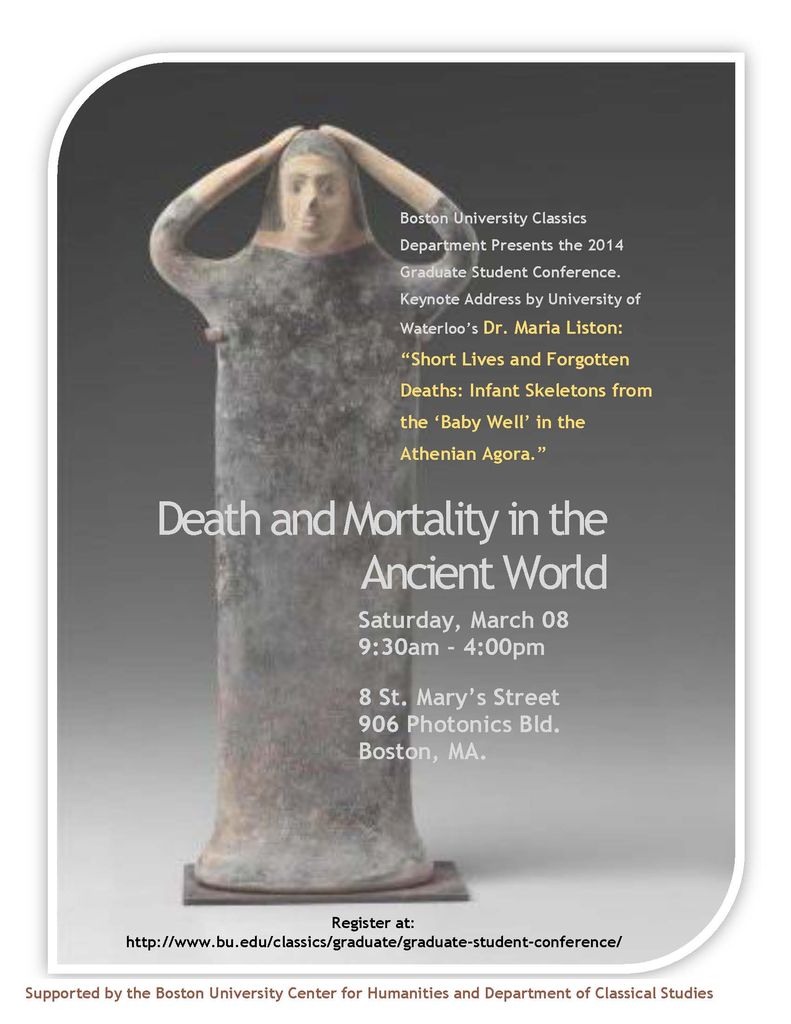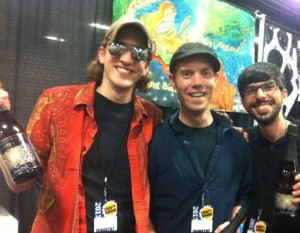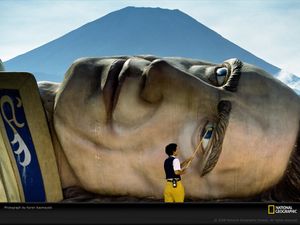March 10, 2014 at 12:13 pm

It seems impossible, sometimes, to delight in the new and exciting. Look at early critics’ and the general public’s reaction to most of modernism for instance. Scorned, scandalized, generally rejected (thank god enough liked it to keep it preserved). And the new can be exhausting in whole other ways. Most of us moved towns even countries to go to school at Boston University. Sometimes, most of the time, that’s excellent, and sometimes, especially when finals and papers rear their ugly heads, we’re homesick. It’s Spring Break now: some of us have stayed in Boston to take advantage of the studentless city; some of us are in all kinds of exotic locations enjoying the sun, the culture, what you will; and some of us answered the call and went home. Those times when we’re homesick, it can be helpful to look at the old and to comfort ourselves with that which is familiar, but we at Core always think turning to something new from the past can help guide us now, through anything.
Susan Cheever, who wrote an essay on E. E. Cummings (e. e. cummings) for Vanity Fair had a similar experience. Caught in a school she didn’t like that seemed to suck her soul out (not at all like BU but maybe like midterms), she desperately needed some inspiration, some drive. And in walks a famous poet, an old friend of her fathers.
Read More »
By fegoss01
|
Posted in Great Personalities
|
Tagged poetry, twentieth century art
|
March 10, 2014 at 11:22 am

In a recent book, How Dogs Love Us: A Neuroscientist and His Adopted Dog Decode the Canine Brain, Dr. Gregory Bernes discusses his study (previously featured in a core blog post here) in which MRI brain scans of dogs were explored and showed human like emotions. However, not all dog enthusiasts have wholeheartedly accepted Bernes work and let him by without critique.
Colin Dayan of the Boston Review finds flaw in the tendency of Bernes and others to compare man's best friend to young children in an effort to enhance our appreciation of them. At first, one may assume that Dayan is speaking against dogs but this is not the case. He writes that, "The urge to characterize dogs as like ourselves speaks to our failure of imagination". Instead, he believes that the intelligence of dogs should be appreciated for what it is: different.
Perhaps animality is what we should be thinking about and not claims for humanity. Dogs live on the track between the mental and the physical and seem to tease out a near-mystical disintegration of the bounds between them. Their knowing has everything to do with perception, an unprecedented attentiveness that unleashes another kind of intelligibility beyond the world of the human.
Read the full article here.
By vpriest
|
Posted in In the News
|
Tagged books, Science
|
March 2, 2014 at 3:45 pm

The late 19th and early 20th century gave birth to some of our world's favorite poets and poetry, something that could be written off as simple proximity, but we at Core believe what makes these writers so important was not only the still resonating effects of political and societal changes they commented on but also because of the interconnectivity of the poets of that time, a connectivity that breached the rest of the 20th century and still has not come to an end.
Read More »
By fegoss01
|
Posted in Great Personalities, Uncategorized
|
Tagged fun, history, interconnectivity, poem, poetry
|
February 25, 2014 at 1:52 pm

To provide a comprehensive, honest profile of an artist can be a demanding task, to say the least, especially to create an unbiased, even critical profile of someone so loved and honored. Especially someone as complicated and genius as Picasso. That is exactly what John Banville believes TJ Clark is capable of doing as Banville explains in this article.
TJ Clark is that odd combination, a Marxist and a Nietzschean; he is also a great critic. His love for and understanding of Picasso’s work is evident in every line of this book, which is based on the text of the Mellon Lectures delivered at the National Gallery of Art in Washington. He is an incomparably close reader of paintings, and the acuity of his thought, allied to a sweeping breadth of reference, makes him the ideal interrogator of Picasso and his achievement.
Nothing is more excellent than to hear intelligent people speak about art, of any type, with a certain intelligence and insight no one else can provide:
“I cannot avoid the conviction that somewhere at the heart of Picasso’s understanding of life . . . lay an unshakeable commitment to the space of a small or middle-sized room and the little possessions laid out on its table. His world was of property arranged in an interior: maybe erotic property . . . but always with bodies imagined in terms that equate them with, or transpose them into, familiar instruments and treasures.”
Banville quotes Clark
How we at Core wish we could attend such a lecture.

This may seem typical artists criticism, but Clark goes deeper and is not afraid to criticize despite popular opinion of this excellent artist in order to provide a truer view, a task not to be taken lightly considering the wealth of people sure to write a critic off for negatively commenting on an old great such as Picasso.

So let us know what you think! Have we found THE voice on Picasso or is Banville just hyping us up? Leave us a comment below.
By fegoss01
|
Posted in Uncategorized
|
February 25, 2014 at 9:33 am

The Co-Evolution of the Geosphere and Biosphere
A talk by Robert M. Hazen
Senior Staff Scientist, Geophysical Laboratory
Executive Director, Deep Carbon Observatory
Washington, DC
Hosted by Scott Morr
Part of the Systems Biology Seminar Series
Sponsored by the Bioinformatics Graduate Program Boston University
Thursday, February 27, 2014 at 12:45 PM
Located at LSEB 103 (24 Cummington Mall)
By vpriest
|
Posted in Events
|
Tagged natural science
|
February 21, 2014 at 5:41 pm
Not everyone is as lucky as those of us in Core. Very few can boast such an encompassing grasp of great works as we can; even less learn how to talk about these works, yet we, also, are able to hold a conversation with the best of them concerning Suicide, The Republic, any of the books we read in however many semesters of Core we take.

Yet we are the minority. Yes, more of the population than ever now attends university (rough estimate of 21.8 million students nation wide in 2013 an increase of over 6 million students since 2000), but many of these students will go their entire college careers without reading any Dante or without even knowing what the Daodejing is. All of which is perfectly fine, of course. For many of these students, the idea that every person should be "well-read" was never reinforced, and the books they read in high school seemed more a chore than a joy helping them educate and enlighten themselves. This applies even more to those who never went to college, although avid readers pop up everywhere, single-handedly keeping libraries and used book stores in business. Without a doubt, the literary world is not the hot topic entertainment source of one hundred, even fifty, years ago.
And as I said, this is ok. Despite many of our personal feelings on the increasingly small literary sphere, no one can be faulted for mass societal changes; no one can fight shows like Breaking Bad or Downton Abbey. Who would even want to? Some things need to be accepted. The real problem comes with the growing idea that being well-read is an elitist pursuit of the pretentious. I remember growing up, if you liked to read you were a bookworm or a nerd (although the title rarely mattered because the books you read provided such assurance of your later success)...

But now we have snobbish. As Laura Miller puts it in this wonderful article about the supposed elitism of the literary world:
Intellectual insecurity is, alas, a pervasive problem in the literary world. You can find it among fans of easy-to-read commercial fiction who insist (on very little evidence) that the higher-brow stuff is uniformly fraudulent and dull, and you can find it among those mandarin bibliophiles who dismiss whole genres (on equally thin evidence) out of hand. One of the favorite gambits of people secretly uncertain about their own taste is identifying some popular book of incontestably lower quality than their own favorites and then running all over the Internet posting extravagant takedowns of it and taunting its fans. Yeah, I’m not crazy about “Fifty Shades of Grey,” either, but I’m not going to invest that much energy in proclaiming this sentiment to the world. To do so suggests you’re less interested in championing good writing than you are in grabbing any chance to feel superior to somebody else.
So there it is, the new question. Is literature becoming more pretentious or are people simply less attuned to it? Let us know what you think in the comments below, and as always, have a wonderful weekend!
By fegoss01
|
Posted in Future of the Book, Great Questions, Other Publications, Uncategorized
|
February 21, 2014 at 4:37 pm
An amusing comic strip, on how we choose to read:

source: theawkwardyeti.com/books
An interesting read may be our article From Scroll to Screen.
By mdimov
|
Posted in Art, Future of the Book, Great Questions, Tuesday Humor
|
Tagged book, codex, comic, funny, screen, tablet, technology
|


 get excited about death.
get excited about death.












